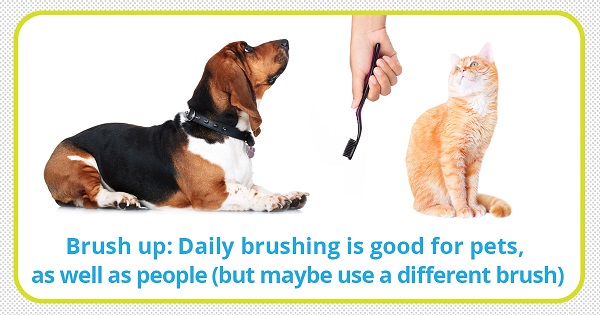
According to the American Veterinary Medical Association, most dogs and cats have some evidence of periodontal disease by the age of three, with symptoms such as bad breath, difficulty eating or chewing, and pawing at the mouth. Pet dental care is important defense against periodontal disease, often known as “gum disease.”
Caused by plaque and tartar buildup, which is loaded with dangerous bacteria, periodontal disease can destroy the tissues that surround the teeth, eventually causing tooth root abscesses and tooth loss. The bacteria from periodontal disease can also enter the bloodstream and cause infections in other areas of the body, leading to heart, kidney, and liver disease.
To help your pet avoid the risks of periodontal disease, here are the answers to some common dental questions:
Are dental problems the same for people and pets?
No. For people, tooth decay (cavities) is the most common dental problem. In dogs, for example, tooth decay represents less than 10% of all dental problems. The most common dental problem for dogs and cats is periodontal disease.
What causes plaque and tartar to form and how does this cause periodontal disease?
Just like your mouth, your pet’s mouth is home to thousands of bacteria. As these bacteria multiply on the surface of the teeth, they form an invisible layer called plaque (biofilm). While some plaque is removed by your pet’s tongue and chewing habits, some remains.
If allowed to build up over time, plaque thickens and mineralizes to become tartar. Tartar accumulates both above and below the gum line, leading to inflammation of the gums (gingivitis), further plaque and tartar accumulation, and eventually serious periodontal disease.
How can I help prevent plaque and tartar buildup?
Certain types of chew toys and treats may help reduce or delay plaque and tartar buildup. Some pet foods are specifically formulated as dental diets that mechanically and/or chemically assist in plaque and tartar control. Water additives are also available. Yet daily brushing is the best defense against tartar buildup. (Please note: Bones, antlers, and other hard chew toys are not recommended as they can chip or fracture the teeth.)
Can I use a toothpaste formulated for humans?
Absolutely not. You should never use human toothpaste to clean your pet’s teeth. Human toothpaste contains ingredients that can cause digestive upset if swallowed by pets. Some also contain xylitol (a sugar substitute) that, while safe for human consumption, can be lethal for dogs. Xylitol is rapidly absorbed into the bloodstream and can cause hypoglycemia (low blood sugar), liver failure, seizures, and even death in dogs.
We have also recently added four new Client Education Handouts with new pet dental health information – just click on the links for more info:
• Dental Pain in Cats
• Dental Pain in Dogs
• Dental Disease and Its Relation to Systemic Disease in Pets
• Risks of Anesthesia-Free Dental Procedures
For any questions or to book a dental appointment for your pet, please email at WetaskiwinAnimalClinic@gmail.com or call us at 780-352-7006.
We’re here to help with any pet concerns.
